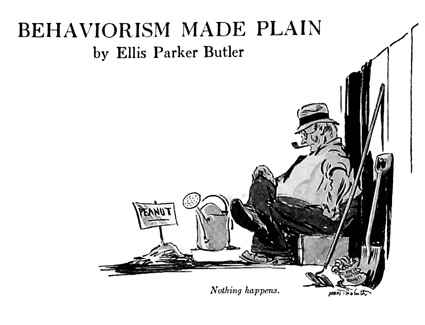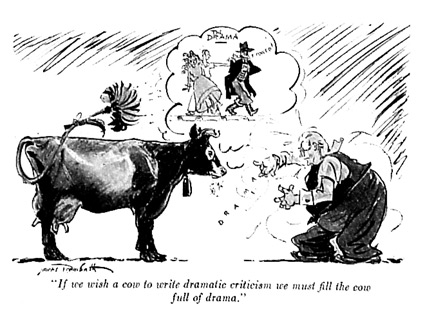from Judge
Behaviorism Made Plain
by Ellis Parker Butler
Since Behaviorism has knocked Freud into a cocked hat everybody is asking me what it is and I say frankly that it is a new kind of psychology or philosophy or something like that. It is not a new book of etiquette or an oil-burner for the furnace.
The Behaviorists class all psychology into two classes or bins. All those who believe in Behaviorism are Behaviorists and all those who do not are Misbehaviorists. These latter include Transcendentalists, Mormons, Freudians, Neckers and Mother Shipton. Briefly, the Behaviorists seek to learn what kind of behavior behavers have by watching them behave when they are behaving. Take for instance a peanut. We will take as our victim a roasted peanut and we will plant it in the garden. The best results are obtained by planting it in a rich loamy soil, about six inches below the surface. We then put a small card on a stick, with the single word "peanut" on the card, and press the lower end of the stick into the soil. We now sit back and wait to see what happens. Nothing happens.

This differs from the Freudian system, which is full of complexes. A Freudian would not take a peanut. Let us suppose that your Uncle Amos, for example, cannot sleep at night for worrying about the butcher's bill. The bill is, let us say, $56.75 or, to put it in round numbers, $60. (This is not quite a round number, the six having a sort of awning sticking up, but it is as near as we can come to a round number for $56.75.)
What is the matter with Uncle Amos is asked by one and all. Why does the butcher bill worry him? Why does he not let Aunt Emma worry about the butcher's bill? We now go to a Freudian, taking Uncle Amos along, leading him by the hand and helping him across the gutters.
"What do you dream about, Uncle Amos?" the Freudian asks Uncle Amos, at the same time patting him on the head to gain his confidence.
"I do not dream at all," Uncle Amos replies. "I cannot get to sleep long enough to dream anything."
"Then you dream of nothing," says the Freudian triumphantly. "This is a very serious case and you had better come back tomorrow when the fee will be $10, the same as it is today. Please pay the cashier as you go out."
Now, by comparing these two systems what do we find? We find (a) that the peanut was buried, and (b) that Uncle Amos has not paid his butcher's bill. We will now dig up the peanut and see what has happened. Nothing has happened.
But suppose we put the peanut on a white china plate and hide it in the pantry. We now select a young child, either male or female, that has not yet tried to talk. We tie the child to a post in the backyard and put a statue of Mussolini in front of it and a little to the left. Now what happens? What does the child do? What does the peanut do? What does the post do? The answer is -- "Behaviorism." Here we have a logical formulation of the way thinking goes on. The result would be the same if we tied the peanut to the post in the backyard and put the child on the white china plate in the pantry, except that the child would fall off the plate.
Or let us take a cow. You can get one from any mail order house by writing "Please send me one (1) cow," and enclosing a money order. Be sure and write your name and address plainly. How does the cow form its thought habits? Let us suppose it is a red cow with burrs in its tail. The cow is thinking about the drama. What does the cow think about the drama, and how does it think? Ah, you little rascal! You think I can't answer that one!
The cow can only think in words. I can only think in words. You can only think in words. Unless we have words we cannot think. Putting a word into a cow so it can use it is called "conditioning" the cow. A horse is conditioned in a different way, with condition powders. This is because the horse has shoes and the cow has not. An automobile also has shoes and so has Lloyd George and all God's chilluns. We will not return to the row. The poor barefoot cow is sitting down waiting for us. It is still thinking about the drama.
Now, since we have learned about Behaviorism, you and I can tell what the cow is thinking about the drama. We know it can only think in words, and we know it can only think in the words that have been "Conditioned" into the cow. We know that the only words that have been conditioned into this cow were conditioned into it by one tow-headed boy with a sore toe when he yelled at the cow, "So, bossy! So, bossy-bossy-bossy!" at close of day. Thus we know that what the cow is thinking about the drama is, "So, bossy! So, bossy!" This is not much to think about the drama, if you ask me, but there you are! The question is. What shall we do about it? How shall we condition the cow to make a dramatic critic of it? Shall we put it on a white china plate and hide it in the pantry? Or shall we, while it is still a young cow and nestling to its mother's breast, take it to the theater?
This was done to a young cow once and when she grew up she got a job with a "Way Down East" road company. In a few months that cow -- her stage name was Tessie Graydon -- was conditioned so that she could think about the drama for hours at a time. She went out to Hollywood and eloped with one of the gentlemen cows in "Blood and Sand," and they are now running a dairy in Ulster County, N. Y., where the cheese comes from. Mr. Cow runs the dairy and Tessie -- her name is Mrs. Bull now -- runs down to New York once a week during the theatrical season and regularly contributes a column of dramatic criticism to the Ulster County Gazette. That just shows you.
I had a cow once that I conditioned to climb trees because I had no barn and I wanted it to learn to build nests, but it fell out of an elm tree and broke its neck.

So, you see, Behaviorism teaches us the difference between men and cows. People have been wanting to know that for a long while, because it is always embarrassing to mistake a cow for a man. Man is the only animal that can have a lot of words in him and then speak them. A cow cannot do that. A cow has no speaking voice. A cow cannot write on a typewriter. A cow cannot use a fountain pen. But Behaviorism shows us what to do about it. If we wish a cow to write dramatic criticism, we must first or (a) fill the cow full of drama, and we must then, second or (b) do as was done with Tessie Graydon and teach her to spell out her words with her feet in deaf-and-dumb alphabet. Then she can do as Tessie did and dictate to a stenographer.